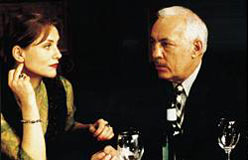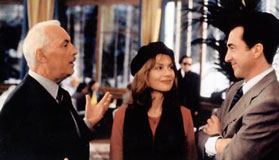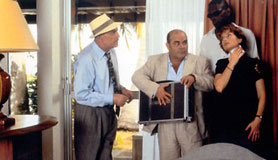The Swindle (Claude Chabrol) 1997
 Claude Chabrol’s The
Swindle would be a relatively conventional caper flick if it were not for
its stunning central performances. Isabelle Huppert and Michel Serrault imbue
this rather straightforward material with surprising ambiguity and intelligence.
Their refusal to let us into their characters completely makes us all the more
compelled to solve their mysteries. As the film opens, we see Huppert at a
roulette wheel in a hotel casino. She begins to flirt a bit with a businessman
at a convention there, but since the film’s titled The
Swindle, we immediately suspect her ulterior motives. Some suspense arises
when we realize that a man (played by Serrault) is watching her, and when the
couple moves on to a bar, he follows. The woman continues to confound and disarm
her prey by flattering him sexually, and before long, she’s slipped him a
roofie (Chabrol loves nothing lately if he doesn’t love spiked drinks) and
gotten into his hotel room. As she waits for him to pass out by feigning
freshening up, the film begins to adopt a sophisticatedly comic tone that it
keeps for the majority of its running time. Before long, the businessman has
passed out, and the man who had been watching them comes to the room, revealing
himself as Victor, the woman’s partner. Though she had been using a different
name, we find her real name is Betty, and the two proceed to casually but
carefully rob the businessman. Their complete lack of nervousness makes it
obvious that they are not new at this game, and their carefulness (they only
steal some of the man’s cash, so he won’t suspect anything when he wakes)
makes it obvious that they are experts. Still, even after we know their secret,
we don’t quite understand them, really. The relationship between the two
remains completely ambiguous. It’s impossible to tell whether they’re
husband and wife, father and daughter or just longtime “business” partners.
Claude Chabrol’s The
Swindle would be a relatively conventional caper flick if it were not for
its stunning central performances. Isabelle Huppert and Michel Serrault imbue
this rather straightforward material with surprising ambiguity and intelligence.
Their refusal to let us into their characters completely makes us all the more
compelled to solve their mysteries. As the film opens, we see Huppert at a
roulette wheel in a hotel casino. She begins to flirt a bit with a businessman
at a convention there, but since the film’s titled The
Swindle, we immediately suspect her ulterior motives. Some suspense arises
when we realize that a man (played by Serrault) is watching her, and when the
couple moves on to a bar, he follows. The woman continues to confound and disarm
her prey by flattering him sexually, and before long, she’s slipped him a
roofie (Chabrol loves nothing lately if he doesn’t love spiked drinks) and
gotten into his hotel room. As she waits for him to pass out by feigning
freshening up, the film begins to adopt a sophisticatedly comic tone that it
keeps for the majority of its running time. Before long, the businessman has
passed out, and the man who had been watching them comes to the room, revealing
himself as Victor, the woman’s partner. Though she had been using a different
name, we find her real name is Betty, and the two proceed to casually but
carefully rob the businessman. Their complete lack of nervousness makes it
obvious that they are not new at this game, and their carefulness (they only
steal some of the man’s cash, so he won’t suspect anything when he wakes)
makes it obvious that they are experts. Still, even after we know their secret,
we don’t quite understand them, really. The relationship between the two
remains completely ambiguous. It’s impossible to tell whether they’re
husband and wife, father and daughter or just longtime “business” partners.
 After their small-scale, but profitable scheme, they leave
the scene of the crime in an RV, and immediately begin to plan their next one.
Their manner is businesslike, with meticulous ledgers of accrued expenses, and
at one point Victor justifies their scheming by saying that it’s “just like
taxes.” Betty takes a vacation between jobs, as if she had a conventional
occupation, and while waiting for her return, Victor passes his time by eating
caviar and watching daytime television. When they finally embark on their next
ploy, Chabrol starts to focus much of his energy on showing us that the lines
between these scammers’ scams and more acceptable forms of graft aren’t as
broad as one might think. When a bellhop waits impatiently for a tip after
performing such meaningless services as demonstrating which faucet is hot and
which is cold, the obligation that good manners requires seems as blatant a con
as anything Victor and Betty concoct. An avaricious old woman who pursues Victor
because of his purported status and wealth seems to be looked at with equal
incredulousness. When they select a semi-legitimate businessman who decides to
rip off his employer, as their new victim, it feels like the circle between the
criminality we call illegal and that which society makes acceptable is made
complete, since an interloper between the two is finally introduced. These two
swindlers prey on conventions in more ways than one, and the bulk of their scam
seems to rely on lulling their victim into a false sense of safety by
demonstrating their sophistication. When the tables are turned on them, they
still are exceedingly polite. Victor offers a hankie to the crying moll of their
kidnapper (who shows his own refinement by listening to the opera Tosca while
threatening them) and even says thank you as his neck is slashed.
After their small-scale, but profitable scheme, they leave
the scene of the crime in an RV, and immediately begin to plan their next one.
Their manner is businesslike, with meticulous ledgers of accrued expenses, and
at one point Victor justifies their scheming by saying that it’s “just like
taxes.” Betty takes a vacation between jobs, as if she had a conventional
occupation, and while waiting for her return, Victor passes his time by eating
caviar and watching daytime television. When they finally embark on their next
ploy, Chabrol starts to focus much of his energy on showing us that the lines
between these scammers’ scams and more acceptable forms of graft aren’t as
broad as one might think. When a bellhop waits impatiently for a tip after
performing such meaningless services as demonstrating which faucet is hot and
which is cold, the obligation that good manners requires seems as blatant a con
as anything Victor and Betty concoct. An avaricious old woman who pursues Victor
because of his purported status and wealth seems to be looked at with equal
incredulousness. When they select a semi-legitimate businessman who decides to
rip off his employer, as their new victim, it feels like the circle between the
criminality we call illegal and that which society makes acceptable is made
complete, since an interloper between the two is finally introduced. These two
swindlers prey on conventions in more ways than one, and the bulk of their scam
seems to rely on lulling their victim into a false sense of safety by
demonstrating their sophistication. When the tables are turned on them, they
still are exceedingly polite. Victor offers a hankie to the crying moll of their
kidnapper (who shows his own refinement by listening to the opera Tosca while
threatening them) and even says thank you as his neck is slashed.
 As the stakes in their swindle are raised, the
double-crosses begin, and The Swindle
becomes a bit less funny and much more gripping. Since Chabrol never lets us
understand the relationship between Betty and Victor, we’re never really able
to feel certain that they won’t cheat each other (though if one pays close
attention during their first scam, they should be able to see many parallels in
the second). Betty’s character seems to swap motivations as often as she swaps
hair colors (which is often), but Huppert keeps us transfixed, always wondering
what’s going on behind her freckled face. She readily blends into each persona
she puts forth, and when she convinces her new paramour she’s obsessed with
the idea of playing a thief, she drolly dresses for the part by donning
sunglasses, a beret, and a suitcase that’s handcuffed to her wrist. As Victor,
Serrault is Huppert’s equal. Though he’s a bit world weary, he still thrives
because of his sense of humor. You
can’t quite tell if his impatience with Betty crops up because she assumes a
leadership position in their scam, because the sight of her new beau sexually
frustrates him, or because he’s just uncomfortable not to be in control.
Watching his frustrations is never a frustrating experience for the audience
though. One of the comic highlights comes when he says, “I adore the mystery
of human relationships,” since he’s such a wonderfully engaging cipher.
Chabrol relishes this ambiguity, and plays it for all it’s worth. He sees the
sense of humor in their predicament, and transforms what might be deadly serious
in other hands into something that’s gleefully light without being unaware of
the potentially dire consequences of its characters’ actions. The
Swindle might not be a deep film, but it makes no missteps in showing us the
steps these two small time crooks take as they attempt to pull off a big time
con.
As the stakes in their swindle are raised, the
double-crosses begin, and The Swindle
becomes a bit less funny and much more gripping. Since Chabrol never lets us
understand the relationship between Betty and Victor, we’re never really able
to feel certain that they won’t cheat each other (though if one pays close
attention during their first scam, they should be able to see many parallels in
the second). Betty’s character seems to swap motivations as often as she swaps
hair colors (which is often), but Huppert keeps us transfixed, always wondering
what’s going on behind her freckled face. She readily blends into each persona
she puts forth, and when she convinces her new paramour she’s obsessed with
the idea of playing a thief, she drolly dresses for the part by donning
sunglasses, a beret, and a suitcase that’s handcuffed to her wrist. As Victor,
Serrault is Huppert’s equal. Though he’s a bit world weary, he still thrives
because of his sense of humor. You
can’t quite tell if his impatience with Betty crops up because she assumes a
leadership position in their scam, because the sight of her new beau sexually
frustrates him, or because he’s just uncomfortable not to be in control.
Watching his frustrations is never a frustrating experience for the audience
though. One of the comic highlights comes when he says, “I adore the mystery
of human relationships,” since he’s such a wonderfully engaging cipher.
Chabrol relishes this ambiguity, and plays it for all it’s worth. He sees the
sense of humor in their predicament, and transforms what might be deadly serious
in other hands into something that’s gleefully light without being unaware of
the potentially dire consequences of its characters’ actions. The
Swindle might not be a deep film, but it makes no missteps in showing us the
steps these two small time crooks take as they attempt to pull off a big time
con.
* * * *
07-29-02
Jeremy Heilman